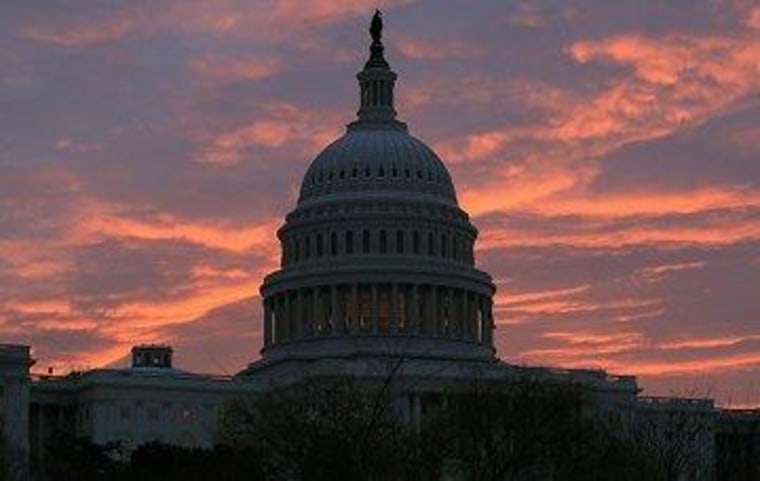Almost exactly four months after the massacre at Sandy Hook Elementary, the Senate took up a bipartisan compromise on firearm background checks -- the heart of the larger effort to reduce gun violence. It was a watered-down compromise written by two conservative senators, but it enjoyed the support of a majority of the Senate and the overwhelming support of the American public.
And yet, this afternoon, it died at the hands of a Republican filibuster anyway.
As the dust settled, a 54-member majority supported the Manchin/Toomey amendment, while 46 opposed it. Because of Republican obstructionist tactics, proponents needed a 60-vote supermajority and came up far short. (Technically, it would have been 55-45, but Majority Leader Harry Reid had to switch his vote for procedural reasons.)
A woman in the Senate gallery shouted "shame on you" at the members below, but she, like the Newtown families, Gabrielle Giffords, and 90% of the country were ignored.
The vote fell largely along partisan lines, but not completely. Four Republicans -- Sens. Collins, Kirk, McCain, and Toomey -- broke ranks and supported expanded background checks, while four red-state Democrats -- Sens. Baucus, Begich, Heitkamp, and Pryor -- sided with the NRA. Three of the four Dems face challenging re-election campaigns in 2014.
Sen. Frank Lautenberg (D-N.J.), one of Congress' staunchest supporters of gun-safety measures, has been absent from the Senate for several weeks with a serious ailment, but made it to the floor today anyway, in case his vote was needed. Indeed, Lautenberg cast a vote from a wheelchair this afternoon.
Given the numbers, the Democratic defections give the opposition a bipartisan veneer, but they were ultimately inconsequential -- even if every member of the Democratic caucus voted together, the background-checks measure still would have lost given the scope of the opposition from the Republican minority.
There is a larger indictment to keep in mind. A filibuster killed a popular and worthwhile proposal today, but that's not all that happened.
Watching the vote, I was reminded of something President Obama recently said while traveling the country to generate support for his gun-safety agenda.
"Ninety percent of Americans support universal background checks. Think about that. How often do 90 percent of Americans agree on anything? ... And yet, there is only one thing that can stand in the way of change that just about everybody agrees on, and that's politics in Washington. You would think that with those numbers Congress would rush to make this happen. That's what you would think. If our democracy is working the way it's supposed to, and 90 percent of the American people agree on something, in the wake of a tragedy you'd think this would not be a heavy lift."And yet, some folks back in Washington are already floating the idea that they may use political stunts to prevent votes on any of these reforms. Think about that. They're not just saying they'll vote 'no' on ideas that almost all Americans support. They're saying they'll do everything they can to even prevent any votes on these provisions. They're saying your opinion doesn't matter. And that's not right."
That's true; it's not right. But thanks to the way our political system currently works, it happened anyway.
Think about this: everything was in place for success. This one simple idea -- close the gun-show loophole and apply background checks to online sales -- had all of the pieces lined up in its favor. The White House invested considerable energy in giving the proposal the best possible chance to prevail; the American mainstream strongly endorsed it; the memory of national tragedy still weighed heavily on everyone's minds; and the only meaningful organization lobbying against it has become a national laughingstock.
"If our democracy is working the way it's supposed to," the bipartisan compromise should have passed while barely breaking a sweat.
Is it not time, then, to look anew at whether our democracy has stopped working the way it's supposed to?
